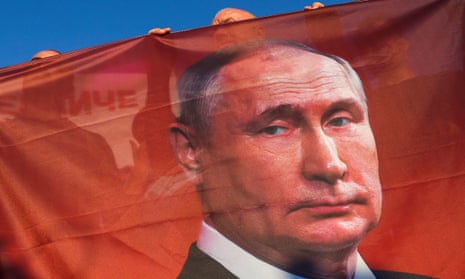They still don’t get it. Even after 18 months of horror in Ukraine, too many prominent politicians in the US and Europe appear unable or unwilling to grasp the existential threat that Vladimir Putin’s Russia poses to all.
They continue to assume this war, like other conflicts, will eventually end in negotiations. Yet the Kremlin demands nothing less than Kyiv’s total capitulation – and that is not going to happen.
Pressure for talks is gathering momentum as a military breakthrough eludes Ukraine’s forces. At the front, frustration leads to escalation and an alarming geographical widening of the war. Last week’s multiple drone attacks deep inside Russia violently dramatised this concern. Fear of nuclear confrontation, rising hunger in grain-starved poorer countries, and public “war fatigue” all fuel talk of talks.
Nicolas Sarkozy, a former French president who should know better, is the latest to join the ranks of mostly hard-right and hard-left French, German and Italian politicians who want to kiss and make up with Putin.
Parroting Russia’s demands, Sarkozy said Ukraine must accept the permanent loss of Crimea and other occupied territory and be excluded from Nato and the EU. Russia and France should “re-establish neighbourly relations”, he said.
Pressure in the US to cut aid to Ukraine and force a peace settlement looks set to grow, regardless of whether Joe Biden is re-elected next year. If victorious, Putin fan Donald Trump may try to impose a quick deal – and pull the plug on Kyiv.
After 40-nation talks held recently in Saudi Arabia, Josep Borrell, the EU foreign policy chief, said he’s planning a “high-level gathering” on Ukraine, probably at the UN general assembly later this month.
But Borrell is not among those seeking to pressure Ukraine to stop fighting or give ground. Sounding pessimistic, he sharply criticised governments for failing to arm Kyiv earlier and better. “When one decides to help a militarily invaded country … hesitating can be very costly,” Borrell said.
“Had decisions been taken faster and with more anticipation on some of the weapons systems we ended up sending, then probably the war would have taken a different path and in any case we would have saved lives.” The ears of Germany’s foot-dragging chancellor, Olaf Scholz, among others, must be burning.
All this to-ing and fro-ing presupposes, however, that Putin is willing to talk – a highly questionable assumption. With winter returning, amid battlefield stalemate, and with swing elections in Europe and the US forthcoming, he probably thinks he has time on his side.
Russian public opinion may also be shifting, not so much in favour of the war as against the shocking thought of defeat. Recent polling cited by Carnegie analyst Tatiana Stanovaya found the Ukrainian drone attacks may be rallying Russians behind the Kremlin.
“The attacks did not in any way increase public desire for peace talks or a Russian withdrawal,” Stanovaya wrote. “If anything, the country is becoming more committed to the fight … out of a more desperate concern for its very survival.
It’s even worse than that, suggested Brookings analyst Constanze Stelzenmüller in a complacency-shattering new essay, The Return of the Enemy. “The Kremlin has repeatedly made clear that only Ukraine’s complete surrender … is acceptable as the basis for a peace agreement,” she wrote.
“The free democracies must now understand that they are dealing with a phenomenon they had believed to be historically obsolete: state rivals who see them as ideological enemies.”
In the “age of convergence” that followed the end of the cold war, the idea of rival blocs fighting as mortal foes appeared redundant, Stelzenmüller argued. But Putin and his ilk never accepted George HW Bush’s “new world order”. For Putin, the prosecution of a continuing anti-western struggle is the war’s wider context and purpose.
Other factors render a meaningful peace process implausible. Any armistice freezing the status quo would reward Russian aggression – and most Ukrainians would rather perish first. A settlement lacking reparations or accountability for war crimes could never stick.
after newsletter promotion
“Conceivably, Russia could be forced to conclude that the price of pursuing Ukraine’s subjugation is unsustainably high by, for example, losing the support of a key non-western power like China, or if the so-called global south turned away from it,” Stelzenmüller suggested.
But since neither scenario is likely, one stark conclusion appeared unavoidable: “Helping Ukraine means helping it win on the battlefield.”
Ending the war must be about “ending Russia’s imperial ambitions in this part of Europe”, urged commentator Judy Dempsey. European governments “cannot afford to accept the war in Ukraine as the new normal”. They should rapidly increase military support to ensure Kyiv’s victory.
Yet Putin – implacable, impervious, homicidal – is not budging. Media frenzy over the Wagner mutiny showed just how frantic are western hopes he will be toppled from within – but they were dashed. Now he’s doubling down on his personal crusade: a geopolitical Russian renaissance, for which he will risk all.
Even if a Ukraine truce were somehow agreed, Putin would most likely treat it as a “tactical pause” preceding his next onslaught. Western leaders, principally Biden, Emmanuel Macron, Scholz and Rishi Sunak, must recognise this reality – and finally start fighting to win.
Here’s what to do: welcome Ukraine into Nato and the EU without further delay. Offer security guarantees and safe sea lanes now, backed by Nato firepower, red lines, more arms, planes and no-fly zones. Warn China, Iran and North Korea to back off. Stop talking about talks. Accept there can be no peace until Russia unconditionally withdraws.
Will the politicians get it at last? Let’s hope so – because while Putin rules, there will be no quick way out, no middle path, no easily available diplomatic fudge. Ukraine must win – or we all lose.
Do you have an opinion on the issues raised in this article? If you would like to submit a letter of up to 250 words to be considered for publication, email it to us at observer.letters@observer.co.uk

